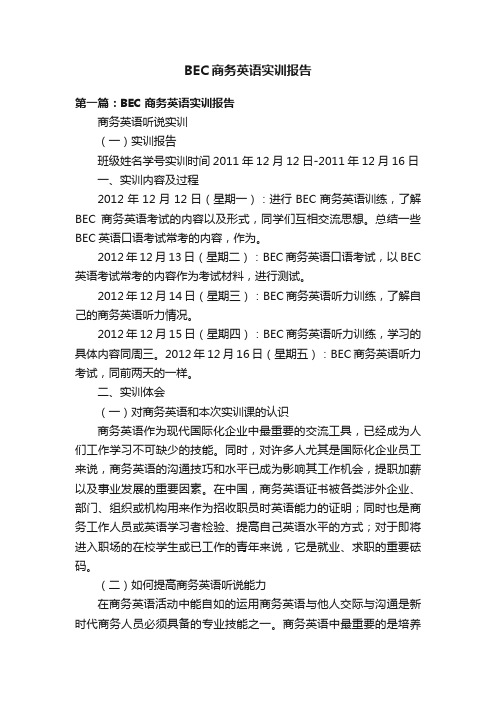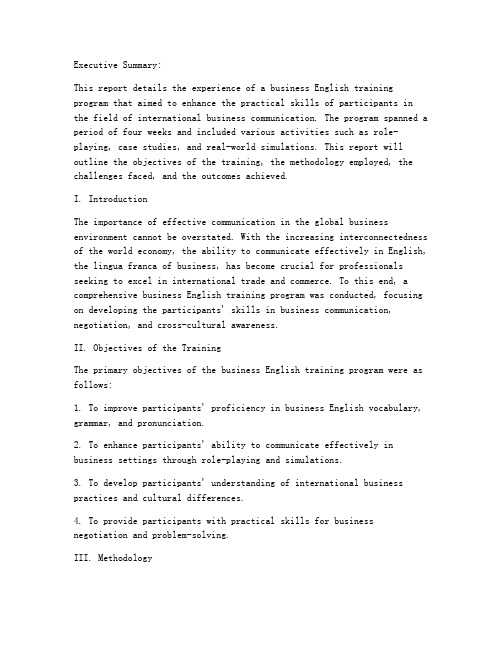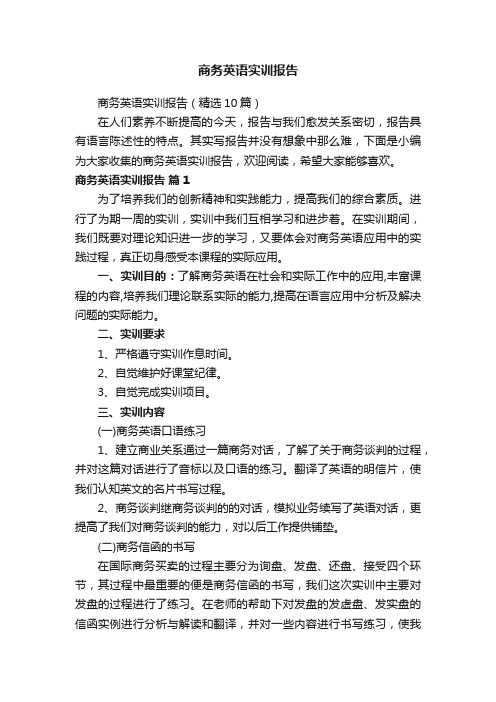商务英语写作实训.pdf
商务英语写作实训 Chapter 7-company profile

Listen to Mr. Tutorial
Well-done
1. Cindy gave a brief introduction about the company’s establishment, business scope, and its good services.
2. It seems a good company overview.
Questions
1. Can we say “All the customers are satisfied with our high quality products…” in a company profile?
2. Should we let business readers know the location of our company?
Compose your message
move on
Company Profile
The Introduction What you do
QA / QC
The Closing
Paragraph 1 --- The introduction
back
1. The year your company was established
1. Product range / services offered
eg. PepsiCo is a world leader in convenient foods and beverages.
2. Machinery and technology used ( are a manufacturer)
4. What products / services you offer
商务英语写作实训 chapter 8-notice

Guangdong Institute of Science and Technology Zhuhai Avenue, Jinwan District, Zhuhai
Date of issue
July 16,2013
NOTICE ATTENTION! MUSIC LOVERS!
Subject
The college is hosting the 6th Inter-School Musical carnival for graduates of 2013 on the Central Square at 7:30 p.m. on June 30, 2013.
Commonly-used announcements: oral announcement and written announcement.
Notices and Announcements
Notices
1. A notice has the similar functions as an announcement, but is less formal and usually shorter.
Write Your Message
Read For Reference
Notices and Announcements
Announcements
An announcement is a public notification of an event. It can be an important and official statement or a small advertisement, which tells people about a coming activity, a new program, a job opening, etc.
BEC商务英语实训报告

BEC商务英语实训报告第一篇:BEC商务英语实训报告商务英语听说实训(一)实训报告班级姓名学号实训时间2011年12月12日-2011年12月16日一、实训内容及过程2012年12月12日(星期一):进行BEC商务英语训练,了解BEC商务英语考试的内容以及形式,同学们互相交流思想。
总结一些BEC英语口语考试常考的内容,作为。
2012年12月13日(星期二):BEC商务英语口语考试,以BEC 英语考试常考的内容作为考试材料,进行测试。
2012年12月14日(星期三):BEC商务英语听力训练,了解自己的商务英语听力情况。
2012年12月15日(星期四):BEC商务英语听力训练,学习的具体内容同周三。
2012年12月16日(星期五):BEC商务英语听力考试,同前两天的一样。
二、实训体会(一)对商务英语和本次实训课的认识商务英语作为现代国际化企业中最重要的交流工具,已经成为人们工作学习不可缺少的技能。
同时,对许多人尤其是国际化企业员工来说,商务英语的沟通技巧和水平已成为影响其工作机会,提职加薪以及事业发展的重要因素。
在中国,商务英语证书被各类涉外企业、部门、组织或机构用来作为招收职员时英语能力的证明;同时也是商务工作人员或英语学习者检验、提高自己英语水平的方式;对于即将进入职场的在校学生或已工作的青年来说,它是就业、求职的重要砝码。
(二)如何提高商务英语听说能力在商务英语活动中能自如的运用商务英语与他人交际与沟通是新时代商务人员必须具备的专业技能之一。
商务英语中最重要的是培养听,说,读,写,译这五项技能,听说是最基本的技能,随着企业与外商进行商务交际活动的增加,对商务英语听说能力的培养也变的越来越重要,因此,听说能力的培养所采取的以下几种有效策略。
商务英语听力是商务英语专业的一门专业核心课程。
学好商务英语听力,对提高学生的英语水平很有帮助。
听力作为语言的第一功能在对外交流活动中已成为第一需要。
而听说往往又是我国外语学习者的弱项和难项。
商务英语实训报告3篇

商务英语实训报告商务英语实训报告精选3篇(一)商务英语实训报告一、实训目的和背景:商务英语实训是指为了提高学生的商务英语应用能力,加强实践能力和团队合作能力,培养学生的商业思维和沟通能力而进行的一种教学活动。
本次商务英语实训的目的是通过模拟商务活动,让学生能够在真实的商务环境下运用所学的商务英语知识和技巧,培养学生的商务交流能力和解决问题的能力。
二、实训内容和方法:本次商务英语实训的内容主要包括商务会议、商务谈判、商务演讲等。
1. 商务会议:通过模拟商务会议,学生可以学习到商务会议的常用词汇和表达方式,了解商务会议的组织和流程。
2. 商务谈判:通过模拟商务谈判,学生可以学习到商务谈判的基本原则和技巧,了解商务谈判的过程和技巧。
3. 商务演讲:通过模拟商务演讲,学生可以学习到商务演讲的基本要求和技巧,提高自己的演讲能力和沟通能力。
实训方法主要采用案例分析、角色扮演等形式,通过小组合作完成实训任务,学生之间互相讨论,共同解决问题。
三、实训效果和评价:通过本次商务英语实训,学生能够掌握商务英语的基本词汇和表达方式,了解商务交流的基本原则和技巧,提高自己的商业思维和沟通能力。
通过模拟商务活动,学生可以在真实的商务环境下运用所学的知识和技巧,培养解决问题的能力和团队合作能力。
实训评价主要根据学生的实训表现和实训成果进行评价,包括课堂表现、小组合作能力、实训报告等。
四、改进措施和建议:为了更好地开展商务英语实训,应加强实训的实践性,更加注重学生的实际操作能力,提高学生的实际应用能力。
此外,还可以增加一些实际案例的分析,让学生能够更加深入地了解商务交流的实际情况,并对其进行分析和解决。
要加强实训过程中的反思和总结,通过学生的反馈和建议,对实训内容和方法进行改进,提高实训的效果和质量。
总结:商务英语实训是提高学生商务英语应用能力的重要教学活动,通过模拟商务活动,让学生能够在真实的商务环境下运用所学的商务英语知识和技巧,培养学生的商业思维和沟通能力。
Chapter 14-Resume

Practical Business English Writing
商务英语写作实训
Writing Tips
Chapter 14
Customize the cover letter for the particular job Indicate your purposes or reasons clearly Give accurate and objective personal information Emphasize what you have to contribute to the company or organization In bold type, highlight your skills that match the job description Use polite words, and expose yourself confidently and optimistically Fix ALL spelling errors and typos Personalize your cover letter. If possible, address your cover letter to the person in charge of interviewing and hiring
Chapter 14
Name
Surname
Given name
Nationality
Date of birth Current address
Marital status Permanent address
Married
Single
Address
Telephone number
Date of availability
商务英语实训报告英文版

Executive Summary:This report details the experience of a business English training program that aimed to enhance the practical skills of participants in the field of international business communication. The program spanned a period of four weeks and included various activities such as role-playing, case studies, and real-world simulations. This report will outline the objectives of the training, the methodology employed, the challenges faced, and the outcomes achieved.I. IntroductionThe importance of effective communication in the global business environment cannot be overstated. With the increasing interconnectedness of the world economy, the ability to communicate effectively in English, the lingua franca of business, has become crucial for professionals seeking to excel in international trade and commerce. To this end, a comprehensive business English training program was conducted, focusing on developing the participants' skills in business communication, negotiation, and cross-cultural awareness.II. Objectives of the TrainingThe primary objectives of the business English training program were as follows:1. To improve participants' proficiency in business English vocabulary, grammar, and pronunciation.2. To enhance participants' ability to communicate effectively in business settings through role-playing and simulations.3. To develop participants' understanding of international business practices and cultural differences.4. To provide participants with practical skills for business negotiation and problem-solving.III. MethodologyThe training program was structured to be interactive and engaging, incorporating a variety of teaching methods:1. Lectures: In-depth discussions on business English topics, such as business correspondence, presentation skills, and cultural nuances.2. Role-playing: Participants engaged in simulated business scenarios to practice real-life communication skills.3. Case studies: Analysis of real-world business situations to develop critical thinking and problem-solving abilities.4. Group work: Collaborative projects to foster teamwork and improve communication within diverse groups.5. Feedback sessions: Regular feedback from trainers and peers to help participants identify areas for improvement.IV. Training ActivitiesThe training program covered a wide range of activities, including:1. Business Correspondence: Participants learned how to write effective emails, memos, and reports, with a focus on clarity, conciseness, and professionalism.2. Presentation Skills: Techniques for delivering impactful presentations, including the use of visual aids, body language, and voice modulation.3. Negotiation Skills: Strategies for successful negotiation, including active listening, conflict resolution, and compromise.4. Cross-Cultural Communication: Understanding cultural differences and how to navigate them in a global business environment.5. Role-playing: Simulated business scenarios to practice communication skills in real-time.V. Challenges FacedDespite the structured nature of the training program, several challenges were encountered:1. Language Barriers: Some participants struggled with English language proficiency, which impacted their ability to fully engage in certain activities.2. Cultural Differences: Misunderstandings due to cultural differences occasionally arose, requiring sensitivity and adaptability from both trainers and participants.3. Time Constraints: The limited duration of the program meant that some topics were covered more superficially than desired.VI. Outcomes AchievedDespite the challenges, the training program was successful in achieving its objectives:1. Improved Language Skills: Participants demonstrated significant improvement in their business English vocabulary, grammar, and pronunciation.2. Enhanced Communication Skills: Participants became more confident in their ability to communicate effectively in business settings.3. Increased Cultural Awareness: Participants gained a deeper understanding of cultural differences and how to navigate them in a global business environment.4. Practical Application: Participants were able to apply their new skills to real-world business scenarios, leading to increased job satisfaction and career advancement opportunities.VII. ConclusionThe business English training program was a valuable experience for all participants. It provided them with the tools and knowledge necessary to communicate effectively in the global business environment. While challenges were encountered, the positive outcomes highlight the program's success in achieving its objectives. As the world continues tobecome more interconnected, the importance of business English skills will only grow, making this training program an essential resource for professionals seeking to succeed in international business.VIII. Recommendations for Future Training ProgramsBased on the experience of this training program, the following recommendations are made for future initiatives:1. Extended Duration: Increasing the duration of the program would allow for a more in-depth exploration of each topic.2. Individualized Attention: Providing one-on-one tutoring or smaller group sessions could address the unique needs of participants with varying language proficiency levels.3. Regular Feedback: Implementing a more structured feedback mechanism could help participants track their progress and identify areas for improvement.4. Diverse Learning Materials: Incorporating a wider variety of learning materials, such as online resources and multimedia content, could make the program more engaging and interactive.By implementing these recommendations, future business English training programs can continue to empower professionals with the skills and knowledge they need to thrive in the global marketplace.。
商务英语实训报告(精选10篇)

商务英语实训报告商务英语实训报告(精选10篇)在人们素养不断提高的今天,报告与我们愈发关系密切,报告具有语言陈述性的特点。
其实写报告并没有想象中那么难,下面是小编为大家收集的商务英语实训报告,欢迎阅读,希望大家能够喜欢。
商务英语实训报告篇1为了培养我们的创新精神和实践能力,提高我们的综合素质。
进行了为期一周的实训,实训中我们互相学习和进步着。
在实训期间,我们既要对理论知识进一步的学习,又要体会对商务英语应用中的实践过程,真正切身感受本课程的实际应用。
一、实训目的:了解商务英语在社会和实际工作中的应用,丰富课程的内容,培养我们理论联系实际的能力,提高在语言应用中分析及解决问题的实际能力。
二、实训要求1、严格遵守实训作息时间。
2、自觉维护好课堂纪律。
3、自觉完成实训项目。
三、实训内容(一)商务英语口语练习1、建立商业关系通过一篇商务对话,了解了关于商务谈判的过程,并对这篇对话进行了音标以及口语的练习。
翻译了英语的明信片,使我们认知英文的名片书写过程。
2、商务谈判继商务谈判的的对话,模拟业务续写了英语对话,更提高了我们对商务谈判的能力,对以后工作提供铺垫。
(二)商务信函的书写在国际商务买卖的过程主要分为询盘、发盘、还盘、接受四个环节,其过程中最重要的便是商务信函的书写,我们这次实训中主要对发盘的过程进行了练习。
在老师的帮助下对发盘的发虚盘、发实盘的信函实例进行分析与解读和翻译,并对一些内容进行书写练习,使我们掌握了英文信函的书写方式、提升了书写技巧。
(三)商务谈判在看完有关商务谈判的视频后,在老师的指导下,我们根据视频中的谈判,对其谈判的案例进行分析。
全面了解了谈判的类型、谈判时的重要因素、谈判时注意的问题及谈判时的信息搜索。
谈判对于商务进行是不可缺少的部分,充分了解谈判的过程和技巧便更一步的促进了合作关系的达成。
(四)进出口贸易信函的分析和书写根据多篇的进出口贸易信函的阅读及分析。
对信函的英汉互译,这不仅对我们英语知识的提高,而且认识了进出口贸易信函书写的方式,在我们多次的练习中提升了写作技巧,更为以后的工作节约了时间。
商务英语写作实训 Chapter 1-Basics of Business__writing

Attention: When blaming your readers, you'd better use weattitude to take some responsibility of your readers' fault.
Consideration
3) Postitive language
Will you use the same formality when you’re writing at work?
Do you think business writing plays an important role in business communication? Why?
--- be more pleasant to read than negative language
Your order cannot be shipped by January 10. Your order will be shipped by January 20.
We cannot fill your order until we receive an exact model number. We can fill your order once we receive an exact model number.
Consideration
4) Hidden Messages
--- avoid imply a negative and unpleasant tone in your writing.
Negative Language:
You overlooked You state that You failed to You claim that You are wrong You do not understand Your delay You forgot to
